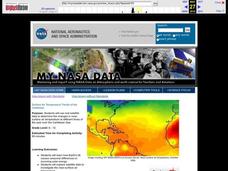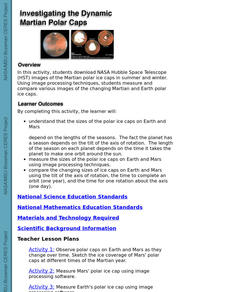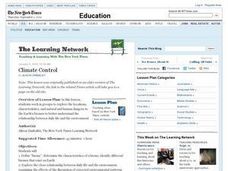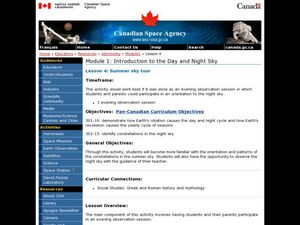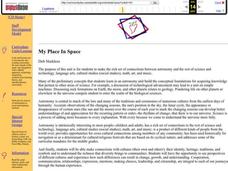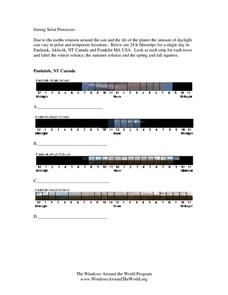Curated OER
Your Own Greenhouse
Students discuss the similarities between the Earth's atmosphere and a greenhouse. In this science lesson, students make their own greenhouses out of plastic bottles and thermometers. Students record the temperature different times of...
Curated OER
Celebrating the Solstice and Equinox
Fourth graders graph the number of daylight hors throughout the year and examine why day length varies. They discover that seasonal changes and latitude on Earth affect the number of hours of daylight in each day. Students listen to...
Curated OER
Surface Air Temperature Trends of the Caribbean
Students investigate the seasonal changes to sea surface and near-surface air temperatures near the equator. They use actual satellite data to track and graph the differences in air and sea temperatures during different seasons in the...
Curated OER
ANIMALS OF ANTARCTICA
Students are introduced to the animals of Antarctica and how they adapt to their environment and the changes of the seasons after being read the story,"Counting Penguins" . They pick an animal and predict how he/she thinks this animal...
Curated OER
Investigating the Dynamic Martian Polar Caps
Learners download NASA Hubble Space Telescope images of the Martian polar ice caps in summer and winter, and measure and compare various images of the changing Martian and Earth polar ice caps.
Curated OER
Solstice and Equinox
Students identify the dates of the solstices and equinoxes and how they relate to the various seasons on Earth. After discussing how the solstice and equinox affect the seasons, students use their bodies to demonstrate the how each...
Curated OER
Weather "Why"
Students research weather and explore how to use their research information. In this weather information lesson plan, students visit a given website for weather forecasts. Students graph the weather, sing weather songs and select a class...
Curated OER
Climate Control
Learners explore the locations, characteristics, and natural and human dangers to the Earth's biomes to better explain the relationship between daily life and the environment.
Curated OER
Weather and Climate
Students identify the words plain and climate and discuss what would happen if it never rained. Students identify and interpret the weather in Poland and create a web illustrating various weather patterns. Students write a 4-line poem...
Curated OER
Heating Up: Direct and Indirect Sunlight
Students, by conducting simulations, explore the effects of direct and indirect sunlight on heating of the Earth.
Curated OER
Sun Path: Interactive On-line Mac or PC
Students use SunPath in the yearly mode to investigate seasonal changes in sunrise, sunset, length of day and sun altitude at their own latitude. Sun Path JAVA applet uses equations for a spherical Earth to calculate the sunrise and...
Curated OER
Summer Sky Tour
Students explore space science by participating in a constellation identification activity. In this astronomy lesson, students view star charts based on the different seasons and define a list of astronomy related terms. Students...
Curated OER
Solstice And Equiniox Curriculum
Students engage in a lesson that investigates finding the dates of the solstices and equinoxes. They define the terms related to the concept and conduct research in order to explain the physical occurrences. They also relate to how the...
Curated OER
Shadow Trackers
Students use online websites to inquire about the cycle of day and night. In this web based lesson, students are able to see the movement of the sun and Earth. Students can look at different parts of the Earth as if they were on the Sun...
Curated OER
My Place In Space
The purpose of this unit is for students to make the rich set of connections between astronomy and the rest of science and technology, language arts, cultural studies (social studies), math, art, and music.
Curated OER
Playground Changes
Students develop both writing and artistic skills as they document changes in their school environment. They observe how the environment of their school playground changes throughout the year by drawing and describing plants, animals,...
Curated OER
The Solar System
Students describe the different bodies that make up our solar system, explain the place of our solar system within the Milky Way Galaxy and the universe, explain day and night and the Earth's movement, and describe the relationship...
Curated OER
NASA Robots
Learners investigate how robots are used in space. In this space science lesson, students participate in an experiment using a blindfold and complete assigned tasks. The learners demonstrate how robots are "thinking" machines.
Curated OER
What's in Our Woods?
Students observe their local forest and document the change that occurs over the school year. For this forestry lesson, students utilize a GPS to mark a certain area of the woods as their study area for the remainder of the year....
Curated OER
Working on the Moon
Learners take a mission to the moon. In this space science lesson, students visit selected websites to discover information about Earth's moon and the solar system. Learners may take virtual missions to the moon and share information...
Curated OER
Glacial Climbing
Young scholars plot the current distribution of glaciers around the Earth and see if there any major trends where glaciers appear to be either growing or shrinking at abnormally high rates.
Curated OER
Seeing Solar Processes
In this seasons activity, students compare 24 hour filmstrips for a single day in Canada, the U.S.A., and the Arctic Circle to determine the different seasons. This activity has 12 fill in the blank.
Curated OER
The Ocean: A Watery World
Learners discuss the proper clothing for the season. They make wind chimes to use as an indicator of movement of the air and observe and identify the various cloud formations. They determine the basic rules of storm safety and discuss...
Curated OER
Habitat Mural
Young scholars build a collage of an ecosystem. The goal is for them to understand interactions in a community, plant and animal adaptations, and how all life depends on plants. This activity is based on Wump World and students describe...




